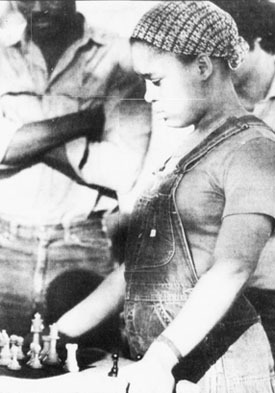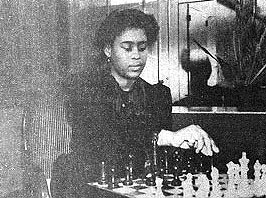Revisiting Baraka Shabazz

Baraka Shabazz at Dupont Circle
Photo by Washington Post
Recently on Facebook, BJ McCurdy of Los Angeles raised a question on the whereabouts of Baraka Shabazz (unrelated to this writer). For the uninitiated, Baraka was a teenage sensation who experienced a meteoric rise in the late 70s. She was the subject of many articles and enthralled a mass media audience. Born in Denver, Colorado, her chess story began when she learned the game at age 12 in an Alaska cabin during a harsh winter season. She improved rapidly and took the city of Anchorage by storm. Seeing her talent, the family moved her to a number of cities in search for the best training ground. The family ultimately settled in Washington, DC.
After quickly ascending and starring in World under-16 in England, Baraka had eclipsed the 2000 U.S. rating, or “Expert” level. To put that in perspective, it made her the 6th best player on the woman’s list and in the 98th percentile of players in the country. In those days being an Expert was a laudable accomplishment for a tournament player. Perhaps there was a tendency for her parents to believe that this status signaled potential in the obscure sport. In the midst of the “Fischer Boom,” there was the temptation to associate every talented youth with the world champion.
Baraka appeared regularly in the national print media and was interviewed for the following segment on ABC News. This is the impetus of this article and I wanted to take this opportunity to share this rare footage of Baraka for the first time.
Video by ABC News
In viewing this video, we can reflect on the short burst of light that Baraka shined over the chess horizon. She was an endearing 15-year old girl venturing into territory not yet explored. In the late 70s, many in the Black community followed her progress with great interest. I remember my mother excitedly showing me an article about Baraka in the Chicago Metro News, a community newspaper.

Baraka Shabazz’s being featured in Chicago Metro News, December 4, 1982 as part of Tony Brown Journal segment.
There she cut a striking figure at the board… demure and poised. I saved that article and the photo appears to the left. I met her in the early 80s during a tournament at the Chicago Palmer House. I noticed her confidence and her effort to speak with perfect diction. It turned out that things were a bit more complicated.
Baraka was gradually becoming disenchanted and sought another path in life. She left chess after participating in the 1983 World Open. Her story represents a common theme in today’s era of prodigious talents. This was before the Venus Williams/Serena Williams fame and the legend of Tiger Woods. Richard Williams wasn’t certain what his daughters would become, no less historic figures. Eldridge Woods may have had a better idea. As a parent, how can you be sure?
Today we have chess parents moving to the “chess capital” of St. Louis and the story of Samuel Sevian whose parents moved from the west coast to the east coast so he could realize his potential. If you add LaVar Ball to the list of parents who are seeking to elevate their prodigy children to new heights, it represents an increasing trend. However, Yusef and Raqiba Shabazz were venturing into uncharted waters in the 70s… at least in chess.
.jpg)
Baraka Shabazz’s charm and angelic face belied her tenacity. At 15, she carried her hopes into the 1981 U.S. Women’s Championship. Still was taken from ABC News footage.
It would be another 15-20 years before girls became regular participants in tournament chess. Whether she knew it or not Baraka represented a hope that girls could be successful and thrive in chess. There were other contemporaries such as Dr. Alexey Root who remains deeply involved in chess development for girls. She played in the 1981 U.S. Women’s Chess Championship with Baraka as the two youngest participants.
Unfortunately for Baraka, her poor showing in the 1981 Women’s Chess Championship may have been a turning point. She became despondent. In a brutally candid 1988 article titled “Ex-Queen’s Gambit,” she stated that the pressure was stifling and that chess ultimately had a destabilizing effect on the family. Relations with her family became strained and she eventually moved to England. Despite moving away from chess, one can sense that she still got tremendous joy from the game and that it had a lasting impact on her life. In turn, she made a lasting impression on us.
She is not exactly scarred by her love-hate relationship with chess, just changed in ways that even she doesn’t fully understand. She believes the discipline, the stardom, even the rejection by some of her family have made her stronger. She shows this strength when she speaks of her child. She says she may, someday, teach him to play chess.
~Excerpt from “Ex-Queen’s Gambit”
Perhaps in retrospect, we can say that things did not turn out as we would’ve hoped for her, but what’s important was that Baraka decided to choose her own path. There is a lot that we can learn from Baraka’s story and chess parents of today would do well to heed to these lessons. Chess is a difficult sport to attain material success, but some parents have learned that it is a wonderful activity for developing academic discipline, social skills and the discipline. We only hope that Baraka will understand the impact she made in chess during her short, but noble run.


Thank you, she is an inspiration to this day and beyond!!!
Just in case you’ve been referred by Jamaal Abdul-Alim’s “Remembering Kenneth Clayton,” (Chess Life, November 2018) here is his obituary.
Kenneth Clayton, chess pioneer (1938-2017)
https://www.thechessdrum.net/blog/2017/12/28/kenneth-clayton-chess-pioneer-1938-2017/